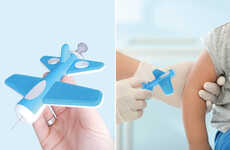The '12 Things You Don't Want to Hear in Surgery' Infographic is Concerning
Jennifer Gosnell — June 20, 2012 — Pop Culture
References: selektorstyle & infographicsite
This hilarious '12 Things You Don't Want to Hear in Surgery' infographic takes a look at the unfortunate things you just don't ever want your doctor or surgeon to say -- especially when under the knife.
Whether it's "Hand me that... thingie" or "oops...," you know that the procedure just isn't going as well as either of you would have hoped. Taking it a step further, the graph shows some more malicious things that you definitely hope your doctor won't say during the procedure like "Is the patient a Republican or Democrat?" and "Accept this sacrifice, O Lord of Great Darkness."
Luckily the satirical graph is of course a comedy, and doesn't depict actual sayings of surgeons, so don't worry if you've got an upcoming procedure.
Whether it's "Hand me that... thingie" or "oops...," you know that the procedure just isn't going as well as either of you would have hoped. Taking it a step further, the graph shows some more malicious things that you definitely hope your doctor won't say during the procedure like "Is the patient a Republican or Democrat?" and "Accept this sacrifice, O Lord of Great Darkness."
Luckily the satirical graph is of course a comedy, and doesn't depict actual sayings of surgeons, so don't worry if you've got an upcoming procedure.
Trend Themes
1. Medical Humor - Creating humorous content around medical procedures and healthcare can help reduce patients' anxiety and improve engagement with medical professionals.
2. Patient Experience - By focusing on improving the patient experience, medical professionals can create more trusting and loyal relationships with their patients, resulting in better health outcomes.
3. Communication Training - Developing more effective communication training programs for medical professionals can help reduce medical errors and improve patient satisfaction.
Industry Implications
1. Healthcare - The healthcare industry can benefit from creating more patient-centered and engaging experiences, utilizing humor and effective communication training to improve the quality of care.
2. Education and Training - Investing in education and training programs for medical professionals can help improve the quality of care and patient outcomes, while reducing medical errors and increasing patient satisfaction.
3. Media and Entertainment - The media and entertainment industry can play a role in creating more humorous and engaging content around healthcare, providing valuable information in a novel and entertaining way.
1.5
Score
Popularity
Activity
Freshness






















